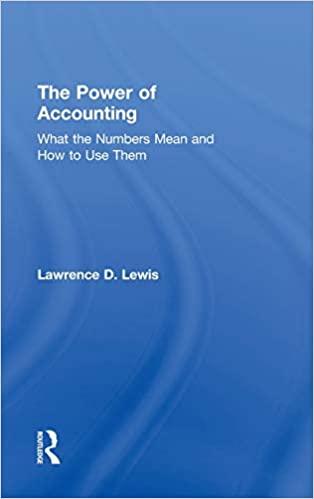Question
Simon Company's year-end balance sheets follow. At December 31 Current Year 1 Year Ago 2 Years Ago Assets Cash $ 25,745 $ 29,798 $ 30,127
Simon Company's year-end balance sheets follow.
| At December 31 | Current Year | 1 Year Ago | 2 Years Ago |
|---|---|---|---|
| Assets | |||
| Cash | $ 25,745 | $ 29,798 | $ 30,127 |
| Accounts receivable, net | 73,153 | 51,631 | 40,169 |
| Merchandise inventory | 90,137 | 70,273 | 41,929 |
| Prepaid expenses | 7,966 | 7,667 | 3,381 |
| Plant assets, net | 230,797 | 209,422 | 185,694 |
| Total assets | $ 427,798 | $ 368,791 | $ 301,300 |
| Liabilities and Equity | |||
| Accounts payable | $ 104,391 | $ 62,326 | $ 40,169 |
| Long-term notes payable | 79,622 | 85,670 | 64,590 |
| Common stock, $10 par value | 163,500 | 163,500 | 162,500 |
| Retained earnings | 80,285 | 57,295 | 34,041 |
| Total liabilities and equity | $ 427,798 | $ 368,791 | $ 301,300 |
For both the current year and one year ago, compute the following ratios:
The companys income statements for the Current Year and 1 Year Ago, follow.
| For Year Ended December 31 | Current Year | 1 Year Ago | ||
|---|---|---|---|---|
| Sales | $ 556,137 | $ 438,861 | ||
| Cost of goods sold | $ 339,244 | $ 285,260 | ||
| Other operating expenses | 172,402 | 111,032 | ||
| Interest expense | 9,454 | 10,094 | ||
| Income tax expense | 7,230 | 6,583 | ||
| Total costs and expenses | 528,330 | 412,969 | ||
| Net income | $ 27,807 | $ 25,892 | ||
| Earnings per share | $ 1.71 | $ 1.59 | ||
Additional information about the company follows.
| Common stock market price, December 31, Current Year | $ 32.00 |
|---|---|
| Common stock market price, December 31, 1 Year Ago | 30.00 |
| Annual cash dividends per share in Current Year | 0.22 |
| Annual cash dividends per share 1 Year Ago | 0.11 |
1. Express the balance sheets in common-size percents. 2. Assuming annual sales have not changed in the last three years, is the change in accounts receivable as a percentage of total assets favorable or unfavorable? 3. Assuming annual sales have not changed in the last three years, is the change in merchandise inventory as a percentage of total assets favorable or unfavorable?
(1-a) Compute the current ratio for each of the three years. (1-b) Did the current ratio improve or worsen over the three-year period? (2-a) Compute the acid-test ratio for each of the three years. (2-b) Did the acid-test ratio improve or worsen over the three-year period?
(1-a) Compute days' sales uncollected. (1-b) Determine if days' sales uncollected improved or worsened in the current year. (2-a) Compute accounts receivable turnover. (2-b) Determine if accounts receivable turnover ratio improved or worsened in the current year. (3-a) Compute inventory turnover. (3-b) Determine if inventory turnover ratio improved or worsened in the current year. (4-a) Compute days' sales in inventory. (4-b) For each ratio, determine if days' sales in inventory improved or worsened in the current year.
(1) Debt and equity ratios. (2-a) Compute debt-to-equity ratio for the current year and one year ago. (2-b) Based on debt-to-equity ratio, does the company have more or less debt in the current year versus one year ago? (3-a) Times interest earned. (3-b) Based on times interest earned, is the company more or less risky for creditors in the Current Year versus 1 Year Ago?
For both the Current Year and 1 Year Ago, compute the following ratios: (1-a) Profit margin ratio. (1-b) Did profit margin improve or worsen in the Current Year versus 1 Year Ago? (2) Total asset turnover. (3-a) Return on total assets. (3-b) Based on return on total assets, did Simon's operating efficiency improve or worsen in the Current Year versus 1 Year Ago?
Step by Step Solution
There are 3 Steps involved in it
Step: 1

Get Instant Access to Expert-Tailored Solutions
See step-by-step solutions with expert insights and AI powered tools for academic success
Step: 2

Step: 3

Ace Your Homework with AI
Get the answers you need in no time with our AI-driven, step-by-step assistance
Get Started


